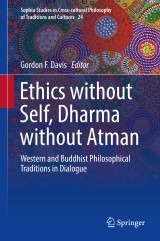Details

Ethics without Self, Dharma without Atman
Western and Buddhist Philosophical Traditions in DialogueSophia Studies in Cross-cultural Philosophy of Traditions and Cultures, Band 24
|
149,79 € |
|
| Verlag: | Springer |
| Format: | |
| Veröffentl.: | 18.07.2018 |
| ISBN/EAN: | 9783319674070 |
| Sprache: | englisch |
Dieses eBook enthält ein Wasserzeichen.
Beschreibungen
<p>This volume of essays offers direct comparisons of historic Western and Buddhist perspectives on ethics and metaphysics, tracing parallels and contrasts all the way from Plato to the Stoics, Spinoza to Hume, and Schopenhauer through to contemporary ethicists such as Arne Naess, Charles Taylor and Derek Parfit. It compares and contrasts each Western philosopher with a particular strand in the Buddhist tradition, in some chapters represented by individual writers such as Nagarjuna, Vasubandhu, Santideva or Tsong Khapa. It does so in light of both analytic concerns and themes from the existentialist and phenomenological traditions, and often in an ecumenical spirit that bridges both analytic and continentalist approaches. </p> <p>Some of the deepest questions in ethics, dealing with the scope of agency, value-laden notions of personhood and the nature of value in general, are intertwined with questions in metaphysics. One set of questions addresses how varying conceptions of selfhood relate to moral values (e.g. the concern of self or selves for the well-being of others); another set of questions addresses how a conception of oneself or one’s selves should or should not affect how one thinks of happiness, or eudaimonia, or – in classical Indian terms – artha, sukha or nirvana. Western philosophy has featured discussion of both, but some would argue that certain traditions of Asian philosophy have offered a more sustained and even treatment of both sets of questions. The Buddhist tradition in particular has not only featured much discussion on both fronts, but has attracted many contemporary philosophers to its distinctive spectrum of approaches, and to what is – from many ‘Western’ points of view – a seemingly subversive analysis of ego, selfhood and personhood, whether in metaphysical, phenomenological or other incarnations. </p>
<p>Part 1. Parallel Debates in Ancient Greek and Ancient Indian Philosophy.- 1. Self and Ethics in Plato and Indian Traditions (Michael Griffin).- 2. Stoicism and Buddhism (Emily McRae).- 3. Classical Scepticism and Nagarjuna (Ethan Mills).- Part 2. Early Modern Philosophical Ethics in Europe: Doubts about Selfhood, Innocence about Atman.- 4. Spinoza and Spinozism: Shadows of Buddhism in Early Modern Philosophy and in Late German Idealism (Gordon Davis).- 5. Hume as a Modern Madhyamika (Jay Garfield).- 6. Kant and Buddhist Ethics (Emer O’Hagan).- Part 3. Modern and Contemporary Philosophers in Dialogue with Buddhist Philosophical Traditions.- 7. Schopenhauer and Nietzsche (Douglas Berger).- 8. Heidegger and Buddhism (Sonia Sikka).- 9. William James and Bertrand Russell (Nalini Ramlakhan).- 10. Derek Parfit and Santideva on Altruism (Stephen Harris).- 11. Charles Taylor and Tensions within the Buddhist Tradition (Ashwani Peetush).- 12. Deep Ecology and Buddhist Ethics (Pragati Sahni).p></p>
Associate Professor and former Chair of Philosophy Dept. (Carleton U.) B.Phil. and D.Phil. in Philosophy, University of Oxford (D.Phil. 2005) Founding executive member of Ethics and Public Affairs doctoral program (Carleton University, Ottawa, Canada) Research interests: Ethical theory, Comparative Philosophy, Buddhist Philosophy, Buddhist Ethics, Metaethics, Political Philosophy, History of Philosophy, Personal Identity, Early Modern Metaphysics Author of “Traces of Consequentialism and Non-Consequentialism in Bodhisattva Ethics” (Philosophy East & West 2013); “Moral Realism and Anti-Realism outside the West” (Comparative Philosophy 2013)
This volume of essays offers direct comparisons of historic Western and Buddhist perspectives on ethics and metaphysics, tracing parallels and contrasts all the way from Plato to the Stoics, Spinoza to Hume, and Schopenhauer through to contemporary ethicists such as Arne Naess, Charles Taylor and Derek Parfit. It compares and contrasts each Western philosopher with a particular strand in the Buddhist tradition, in some chapters represented by individual writers such as Nagarjuna, Vasubandhu, Santideva or Tsong Khapa. It does so in light of both analytic concerns and themes from the existentialist and phenomenological traditions, and often in an ecumenical spirit that bridges both analytic and continentalist approaches. <p>Some of the deepest questions in ethics, dealing with the scope of agency, value-laden notions of personhood and the nature of value in general, are intertwined with questions in metaphysics. One set of questions addresses how varying conceptions of selfhood relate to moral values (e.g. the concern of self or selves for the well-being of others); another set of questions addresses how a conception of oneself or one’s selves should or should not affect how one thinks of happiness, or eudaimonia, or – in classical Indian terms – artha, sukha or nirvana. Western philosophy has featured discussion of both, but some would argue that certain traditions of Asian philosophy have offered a more sustained and even treatment of both sets of questions. The Buddhist tradition in particular has not only featured much discussion on both fronts, but has attracted many contemporary philosophers to its distinctive spectrum of approaches, and to what is – from many ‘Western’ points of view – a seemingly subversive analysis of ego, selfhood and personhood, whether in metaphysical, phenomenological or other incarnations. </p>
Is unique in its coverage of multiple traditions in the history of philosophy Addresses the relationship between personal identity and the scope of moral obligation Is the first book to compare Buddhist philosophical ideas with both ancient and modern Western philosophers Deals with Nagarjuna, Vasubandhu and Santideva from the combined perspective of analytic ethics and scholarship in the history of philosophy Brings together many of the most distinguished practitioners of Buddhist philosophy
<p>Is unique in its coverage of multiple traditions in the history of philosophy</p><p>Addresses the relationship between personal identity and the scope of moral obligation</p><p>Is the first book to compare Buddhist philosophical ideas with both ancient and modern Western philosophers</p><p>Deals with Nagarjuna, Vasubandhu and Santideva from the combined perspective of analytic ethics and scholarship in the history of philosophy</p><p> </p><p>Brings together many of the most distinguished practitioners of Buddhist philosophy</p>

















